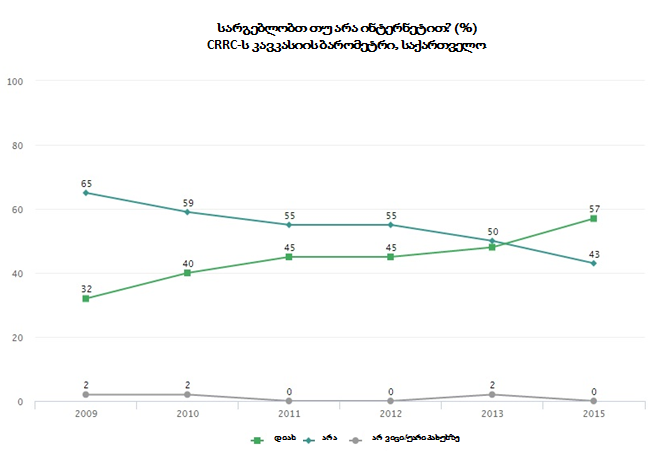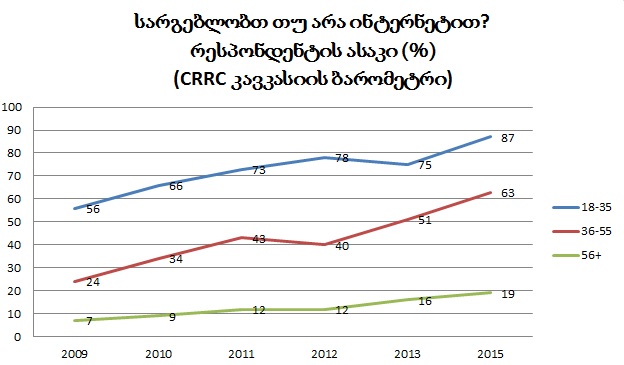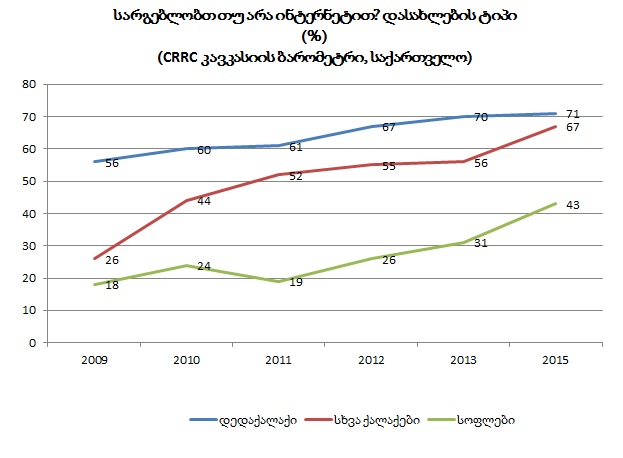მთელს მსოფლიოში ინტერნეტით სულ უფრო მეტი ადამიანი სარგებლობს და ამ მხრივ, არც საქართველოა გამონაკლისი, თუმცა ზოგიერთ ქვეყანაში მას მოსახლეობის მაინც მცირე ნაწილი იყენებს. 2009 წელს ინტერნეტით საქართველოს მოსახლეობის მხოლოდ მესამედი სარგებლობდა, დღეს მოსახლეობის ნახევარზე ოდნავ მეტი უკვე მისი მომხმარებელია. წარმოდგენილი ბლოგ პოსტი CRRC-ს კავკასიის ბარომეტრის შედეგებზე დაყრდნობით აანალიზებს, თუ როგორ შეიცვალა ინტერნეტის მოხმარების ტენდენცია 2009-დან 2015 წლამდე დასახლების ტიპისა და ასაკობრივი ჯგუფების მიხედვით. 2012 წლამდე მათი რიცხვი, ვისაც არასდროს უსარგებლია ინტერნეტით, ან საერთოდ არ იცოდა, ეს რა იყო, მომხმარებლების რიცხვს უსწრებდა. 2013 წელს მათი რიცხვი გათანაბრდა, ხოლო 2015 წლის კავკასიის ბარომეტრის მონაცემების თანახმად, დღეს უკვე მოსახლეობის უმეტესობა (57%) ინტერნეტს იყენებს, სხვადასხვა სიხშირით, მაგრამ მაინც.
შენიშვნა: კითხვა შემდეგნაირად იყო დასმული: რამდენად ხშირად სარგებლობთ ინტერნეტით? ამ შემთხვევაში პასუხები „ყოველდღე“, „კვირაში ერთხელ მაინც“, „თვეში ერთხელ მაინც“, და „უფრო იშვიათად“ გაერთიანდა პასუხში „დიახ“. ხოლო პასუხები „არასდროს“ და „არ ვიცი ინტერნეტი რა არის“ დაჯგუფდა პასუხში „არა“.
როგორც მოსალოდნელი იყო, ახალგაზრდები უფრო მეტად არიან ინტერნეტის მომხმარებლები, ვიდრე უფროსი ასაკის ადამიანები. 18-დან 35 წლამდე ახალგაზრდების 87% ინტერნეტით, სულ ცოტა მაინც სარგებლობს. ხოლო 56-ზე მეტი წლის ადამიანებში ეს რიცხვი მხოლოდ 19%-ია. ყველაზე დიდი ცვლილება შეინიშნება 36-დან 55 წლამდე ასაკობრივ ჯგუფში, სადაც ინტერნეტით მოხმარების რიცხვი 2009-დან 2015 წლამდე 24%-დან 63%-მდე გაიზარდა.
შენიშვნა: ზემოთ მოცემული დიაგრამა ასახავს იმ ადამიანთა რიცხვს, რომლებიც ინტერნეტით სხვადასხვა სიხშირით, თუმცა სარგებლობენ.
სიახლეს არ წარმოადგენს ის ფაქტი, რომ ინტერნეტით სარგებლობა ყველაზე დაბალია სოფლად მცხოვრებ მოსახლეობაში. 2015 წელს სოფელში მცხოვრებთა ნახევარზე ოდნავ ნაკლებმა განაცხადა, რომ სარგებლობს ინტერნეტით მაშინ, როდესაც ქალაქებში 10-დან 7 ადამიანი იყენებს ინტერნეტს. 2009 წლის შემდეგ, დედაქალაქის გამოკლებით, სხვა ქალაქებში ინტერნეტით სარგებლობა დაახლოებით 2.5-ჯერ გაიზარდა, სოფლებში კი 2-ჯერ.
შენიშვნა: ზემოთ მოცემული დიაგრამა ასახავს ინტერნეტის სხვადასხვა სიხშირით მომხმარებელთა რიცხვს.
ამჟამად, საქართველოს სრულწლოვანი მოსახლეობის უმეტესობას ინტერნეტთან შეხება აქვს. როგორც მოსალოდნელი იყო, ახალგზრდებში ინტერნეტით მოხმარების მაჩვენებელი მკვეთრად უსწრებს უფროსი ასაკის ადამიანების მაჩვენებელს. სოფლად მცხოვრები ადამიანების ნახევარზე ოდნავ ნაკლები სარგებლობს ინტერნეტით. თუმცა, ეს რიცხვი ნელ-ნელა იზრდება. თუ ეს ტენდენცია გაგრძელდება, სოფლად მცხოვრები მოსახლეობის უმეტესობასაც მალე ონლაინ ვიხილავთ.
ამ და სხვა საინტერესო მონაცემების სანახავად, გთხოვთ იხილოთ CRRC-საქართველოს ონლაინ ანალიზის ვებ-გვერდი.















